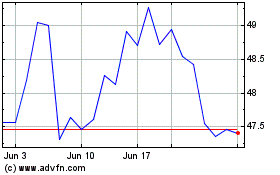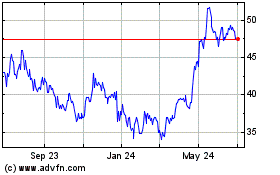By Alyssa Abkowitz
BEIJING -- Chinese internet giant Tencent Holdings Ltd. says it
wants to improve the world through technology. David Wallerstein is
on it.
Mr. Wallerstein, 43, is Tencent's chief exploration officer. The
unusual title reflects his mission: To find so-called moonshot
investments that could lead to big payoffs down the road. Mr.
Wallerstein, a native Californian, has guided Tencent's investments
in startups such as Lilium Aviation, which hopes to cut down on
travel time with its electric flying cars, and Phytech Ltd., which
helps farmers figure out when their plants need water.
"People who don't know him that well can make a mistake and say,
'This is an odd pocket of utopian money coming out of China'," said
Matt Ocko, a Silicon Valley venture capitalist and friend of Mr.
Wallerstein's. "Ten minutes, an hour, a day later -- depending on
how astute they are -- they realize he and Tencent mean
business."
Tencent, which built an empire on videogames and the popular
WeChat social-media app and QQ messaging service, can afford to
take some risks. It has a market value of nearly half a trillion
dollars and about $24 billion in cash on hand, and has invested
nearly $9 billion in enterprises outside China in the past five
years, according to Dow Jones VentureSource. Last year, it snared a
5% stake in Tesla Inc.
The company is committed to "improving human life," said Tencent
president Martin Lau in an emailed statement, adding that Mr.
Wallerstein is advancing that agenda through exploratory investing
in health care, agriculture and transportation.
"We basically need to take our planet back," Mr. Wallerstein
said in a recent speech in Beijing. "This is how we're doing it at
Tencent."
Tencent chairman and chief executive Ma Huateng -- also known as
Pony Ma -- and his co-founders know Mr. Wallerstein's sharp
investment eye firsthand. In 2001, Tencent was an unprofitable
startup with a popular messaging service called QQ. Mr. Wallerstein
was working in Beijing for the investment arm of Naspers Ltd., the
South African media conglomerate.
Seeing QQ's potential, Mr. Wallerstein flew to Shenzhen, where
Tencent is based, to propose an investment. Mr. Ma "politely
declined," Mr. Wallerstein recalled. "I was very shocked."
Ultimately, Naspers bought 46.5% of Tencent for $32 million from
two of the company's earliest investors. Naspers's stake is now
worth nearly $180 billion today, even after being diluted to
33.4%.
Mr. Wallerstein soon joined Tencent, becoming the sixth man on
its leadership team and helping in its early growth, including
forging deals with Nokia and Motorola to integrate QQ into their
handsets. After about a decade overseeing international business,
Mr. Wallerstein moved into his current role, which he says allows
him to work with entrepreneurs around the world. He remains the
only foreigner on Tencent's 15-member management team, and is its
main conduit to Silicon Valley.
Today, the guitar-playing vegan is based in Palo Alto, Calif.,
where he and his five-member team work out of a converted church. A
fluent Mandarin speaker, he visits China every six weeks. Longtime
associates say Mr. Wallerstein's quirky personality -- he once
welcomed guests to a San Francisco dinner party by asking them to
share their most embarrassing moments -- and unusual role at
Tencent belie an investor who is dead serious.
Silicon Valley angel investor Ron Conway calls himself a fan.
Mr. Conway said the two meet and trade notes on investment
prospects several times a year.
"He encourages us to make the leap and invest in new market
areas that normally we wouldn't look at," Mr. Conway said. Both
their firms have invested in Watsi, a crowdsourcing platform to
fund medical care in developing countries, and Skymind, an
artificial-intelligence startup.
In September, Tencent led a $90 million investment in Lilium,
the air-taxi company. "I wasn't thinking about it as a cool
technology," Mr. Wallerstein said in an interview. "I was thinking,
how do you solve the problem of cities being overcrowded and no
roads in developing areas?"
Mr. Wallerstein also oversaw Tencent's 2011 acquisition of Los
Angeles-based Riot Games, whose "League of Legends" is among the
world's most popular games. Riot Games co-founder Marc Merrill said
Mr. Wallerstein mediated between the two companies when Tencent
wanted to use "League of Legends" characters in other content they
owned, including comics and fiction. Riot had resisted on grounds
that it would diminish its brand.
"David has helped contextualize things and Tencent has stayed
true to allowing Riot to remain independent," Mr. Merrill said.
Mr. Wallerstein is using Tencent for other creative pursuits as
well. A fan of heavy metal, he has recorded an album of original
songs that he plans to release on Tencent's music streaming service
this spring. One song, entitled "The Last Chance," opens with
nature sounds, and ends with Mr. Wallerstein singing, "This is a
chance to face the reality/One last dance for all of humanity,"
before fading out with the sound of a clock ticking.
Write to Alyssa Abkowitz at alyssa.abkowitz@wsj.com
(END) Dow Jones Newswires
February 08, 2018 09:14 ET (14:14 GMT)
Copyright (c) 2018 Dow Jones & Company, Inc.
Tencent (PK) (USOTC:TCEHY)
Historical Stock Chart
From Mar 2024 to Apr 2024

Tencent (PK) (USOTC:TCEHY)
Historical Stock Chart
From Apr 2023 to Apr 2024
